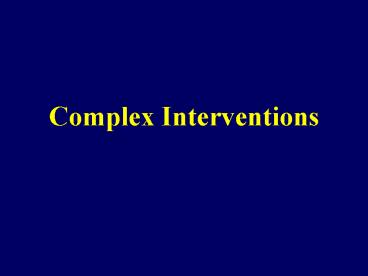Complex Interventions PowerPoint PPT Presentation
1 / 28
Title: Complex Interventions
1
Complex Interventions
2
Basis of this presentation
- The development of the revised MRC framework
over the last 18 months - This process is not complete the revised
framework cannot yet by quoted or used!
3
Overview
- What is a complex intervention?
- The old MRC framework and its problems
- The revised MRC framework
- Assessing complex interventions
- Why does all this matter?
4
1) What is a CI?
- Complex interventions are traditionally
described as Interventions that contain several
interacting components - BUT
- Then ALL interventions are complex
- There are several other dimensions of complexity
5
Some Dimensions of Complexity
- Number of interacting components within the
experimental and control interventions - Number/difficulty of skills and behaviours
required by those delivering or receiving the
intervention - Number of groups or organisational levels
targeted - Degree of flexibility or tailoring of
interventions permitted - (and others - Lewin et al)
6
2) The old MRC Framework for Complex
Interventions
- (Campbell et al BMJ 2000)
7
The framework (2000)
Theory Modelling Exploratory
RCT Implementation
Preclinical Phase 1 Phase 2 Phase 3 Phase 4
8
Problems
- Model from drug development
- Linearity implied by the diagram
- Theory and modelling phases not explained
- Assumption that traditional RCTs are the only
option - Lack of attention to context
- and many others
9
The medical model
- The old framework was embedded in the medical
model of health care - Many complex interventions that might improve
health having nothing to do with medicine
alterations in housing or education for example - We need to know how to evaluate these forms of
complex intervention as well
10
The old framework is very widely quoted BUT
the world has moved on since the late 1990s, with
much new methodology and experience
11
3) The revised MRC framework for complex
interventions(?Craig et al 2008?)
12
Developing The Revised Framework
- Workshop funded by MRC PHSRN, led by Paul Dieppe,
Janet Darbyshire and Sally McIntyre, held in May
2006, c 30 invited attendees, with some of those
who developed the framework - Writing committee of PD, JD, SM Peter Craig,
Susan Michie, Irwin Nazareth, Mark Petticrew - Review by MRC HSPHRB
13
The revised framework
- Summary of what makes an intervention complex,
and the process of development and testing as
laid out - Questions researchers need to ask themselves
- Examples of complex intervention studies using a
wide variety of designs including
non-randomisation
14
4) Assessing complex interventions
15
You have permission to
- Use a wide variety of designs and approaches
- To use non-randomised evaluations
- To vary the nature of the intervention
16
Different randomised designs
- Individually randomised trials
- Cluster randomised trials
- Stepped wedge designs
- Preference trials (many varieties)
- Randomised consent designs
- N-of-1 designs
- Examples of all these provided
17
Two infrequently used designs
18
The step-wedge design
Seven blocks of individuals/units
Sequential entry into the trial in
randomised order
Time
19
The pre-randomised trial nested within an
observational study
Ascertain subjects (community?)
Consent to an observational study
RANDOMISE
Consent to trial
Identical measures, control group informed
at end
20
The use of non-randomised designs
- Randomisation is occasionally unnecessary or
inappropriate - Randomisation is quite often impossible for
example if the intervention has already been
implemented - Observational studies can provide important data
and are often better than nothing
21
An Example
- Does air pollution kill people?
- This question is not likely to be answered by a
classical RCT we will have to rely on obtaining
observational before-and-after data when and if
governments choose to do something about air
pollution
22
An Example
- Two observational studies on air pollution
- Clancy et al, Lancet 2002 looked at death rates
before and after Dublin banned coal sales - Hedley et al, Lancet 2002 studied death rates
before and after Hong Kong switched to low
sulphur fuels - Less air pollution DOES reduce death rates
23
Trial Fidelity
- A principle of the classical RCT is that everyone
gets the same intervention - This does not mirror real life
- During a complex intervention trial there may be
variations in intervention delivery (by different
people for example) and/or changes over time - This is OK
24
4) Why does all this matter so much?
25
- The evil multi-national pharmaceutical industry
has a stranglehold on research and development in
health care the classical placebo controlled
RCT suits them well
26
- The evil multi-national pharmaceutical industry
has a stranglehold on research and development in
health care the classical placebo controlled
RCT suits them well - Behavioural based interventions are the only way
forward for chronic disease prevention and
treatment the classical placebo controlled RCT
is no good for them
27
The barmy right-wing of the Cochrane religious
movement does not understand any of this
28
CONCLUSION
- We are slowly getting more experience with
difficult complex intervention trials, and we are
making progress but there is still a long way
to go

